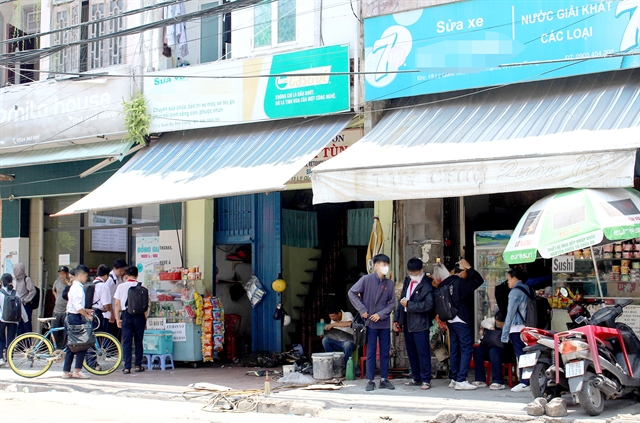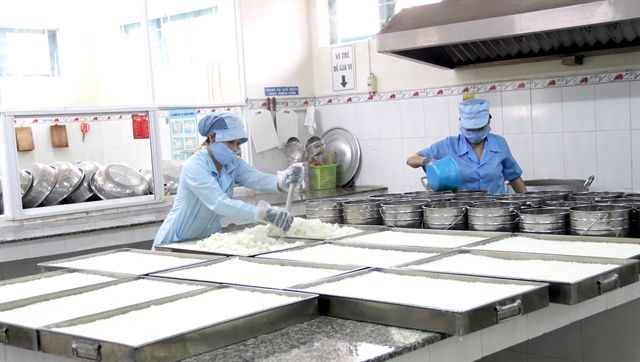 Society
Society

 |
| In front of a school gate in Nha Trang City, many students still buy snacks after school hours. — VNA/VNS Photos Phan Sáu |
KHÁNH HÒA Recent cases of food poisoning among students in the south central coastal province of Khánh Hòa have sounded the alarm on food safety at school gates.
Since the beginning of 2024, out of five food safety incidents in the province, four have involved students, Tin Tức (News) newspaper reported.
In an incident in late January, 23 students from a school in Ninh Hòa Town were hospitalised after consuming candy brought in by a classmate. Although they have since recovered and been discharged, the incident has served as a reminder of the importance of effective school food safety management.
Châu Đình Hùng Sơn, head of the Department of Education and Training in Ninh Hòa Town, described this as the first major suspected case of food poisoning in the town.
Local schools have been proactive in educating students about food safety and the risks of food poisoning.
Following this incident, the Department of Education and Training has ramped up awareness raising campaigns and is eagerly awaiting findings from relevant authorities to implement further measures ensuring food hygiene and safety at schools.
In late March, public concern peaked following a widespread food poisoning incident linked to a chicken rice eatery on Bà Triệu Street, Nha Trang City, which left over 360 people needing hospital treatment.
A local high school in Xương Huân Ward, Nha Trang City, witnessed multiple students hospitalised after consuming street food outside the school gates.
Despite monitoring and treatment, the incidents persisted, with two more cases in early April affecting students in Vĩnh Trường Ward, Nha Trang City, and Tô Hạp Town, Khánh Sơn mountainous district.
In response, schools in the district have joined forces with local authorities to enforce strict food safety regulations both inside and outside school boundaries, aiming to prevent future incidents and restore public trust.
Amid growing public concerns regarding food safety at school entrances, Kim Anh, a mother of a first-grade student at Lộc Thọ Elementary School in Nha Trang City, underscores the importance of scrutinising her child's school meals.
She and numerous other parents, routinely conducts surprise inspections of the school kitchen.
She said that the food meets stringent safety, hygiene, taste and nutritional standards.
Kim Anh and other parents concur with the resolution to prohibit their children from consuming food outside the school premises, all with the aim of safeguarding their children's optimal health.
Trương Thị Tâm, principal of Lộc Thọ Elementary School in Nha Trang City, asserted that ensuring food safety within and outside the school premises is not just a matter of public perception, but a continuous and regular duty of the school.
For the boarding kitchen, the school strictly adheres to principles from food reception, preparation and cooking, to serving students. The school has established a board of directors for the boarding kitchen, consisting of various members from the school and parents.
To date, no student has suffered from food poisoning at the school.
Vice Principal of Phước Tiến Elementary School in Nha Trang City Võ Thị Hồng Hải sheds light on the multifaceted issues surrounding food safety at school gates.
She pointed out that busy parents often resort to letting their children buy food from nearby eateries, which may not prioritise safety standards.
 |
| Staff at the canteen of Phước Tiến Elementary School in Nha Trang City ensure compliance with food safety and hygiene standards at the boarding kitchen. |
To combat this, the school has taken a proactive approach, establishing a self-managed school security team to monitor the area and ensure no unauthorised vendors operate near the gates.
Additionally, during initial school meetings, teachers emphasise to parents the importance of avoiding street vendors to ensure their children have clean and safe food and beverages.
In the 2023-24 academic year, Khánh Hòa Province is home to 529 schools accommodating over 290,000 students.
Despite efforts by the Department of Education and Training to enforce food safety protocols, recent incidents outside school premises have sparked concerns.
The department's Director Võ Hoàn Hải stressed that ensuring food safety requires collaboration from all stakeholders.
The agency continues to urge schools to uphold strict standards in their kitchens and regulate vendors operating near school entrances.
Fostering effective communication and education among families, parents, and students remains paramount in safeguarding student health.
To address these challenges, the province has designated a month for comprehensive food safety inspections, involving provincial teams scrutinising all establishments, including schools.
Đinh Văn Thiệu, deputy chairman of the provincial People's Committee, emphasised the importance of conducting thorough inspections in conjunction with urban order checks on street food vendors.
Strict measures will be taken against violators, including the suspension of operations and public disclosure of infractions through various media channels.
In 2022, a school in Nha Trang City faced a severe food safety breach, resulting in numerous student hospitalisations and one fatality.
Subsequent to this tragedy, local authorities, in conjunction with the provincial Department of Education and Training, enacted rigorous measures to safeguard school canteens. These efforts have yielded positive results, with no further incidents of food poisoning reported on school premises. — VNS